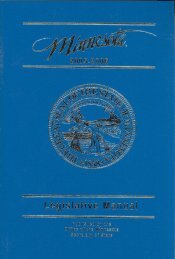Minnesota Board of Pharmacy - Minnesota State Legislature
Minnesota Board of Pharmacy - Minnesota State Legislature
Minnesota Board of Pharmacy - Minnesota State Legislature
Create successful ePaper yourself
Turn your PDF publications into a flip-book with our unique Google optimized e-Paper software.
expertise in accounting and financial management, human resources, contracts, purchasing and<br />
information technology. ASU employs six full-time staff members, one 0.7 FTE temporary<br />
staff member and one 0.6 FTE staff member to provide services to the 18 Health-Related<br />
Licensing <strong>Board</strong>s and their 170 employees. (Please note that two <strong>of</strong> the full-time staff members<br />
and the temporary 0.7 FTE staff member are IT specialists and, consequently, are technically<br />
now employees <strong>of</strong> the Office <strong>of</strong> Enterprise Technology – although they continue to do work for<br />
the <strong>Board</strong>s and their salaries are still jointly paid by the <strong>Board</strong>s). Jointly funding the ASU<br />
means that each <strong>Board</strong> does not have to hire staff with expertise in these areas. Some <strong>of</strong> the<br />
larger <strong>Board</strong>s have IT specialists that focus exclusively on <strong>Board</strong>-specific projects. The IT<br />
specialists assigned to ASU provide programming and desktop support to smaller boards and<br />
administer the IT equipment, servers and networks used by all <strong>of</strong> the <strong>Board</strong>s. The <strong>Board</strong>s’ have<br />
been told that the Small Agency Resource Team (SmART) that is run by the Department <strong>of</strong><br />
Administration was modeled after our ASU.<br />
• We jointly fund the Health Pr<strong>of</strong>essionals Services Program (HPSP), which provides the <strong>Board</strong>s<br />
with an alternative method for monitoring health care pr<strong>of</strong>essionals whose ability to safely<br />
practice is impaired by chemical dependency or by physical or mental illness. In the past,<br />
<strong>Board</strong> <strong>of</strong> <strong>Pharmacy</strong> staff had to directly monitor such pr<strong>of</strong>essionals - with only limited<br />
resources. Chemical dependency and health care treatment records were reviewed by the<br />
<strong>Board</strong>’s Executive Director. The <strong>Board</strong>’s staff also scheduled toxicology screens and tracked<br />
the results using spreadsheets. The case workers at HPSP now perform such duties, following<br />
impaired health pr<strong>of</strong>essionals and ensuring that they have appropriate evaluation, treatment and<br />
monitoring. Those case workers have special training and expertise in performing these duties.<br />
Please note that the HPSP is authorized by <strong>Minnesota</strong> Statutes §214.31.<br />
• The Executive Directors <strong>of</strong> the <strong>Board</strong>s hold a monthly meeting <strong>of</strong> the Executive Director’s<br />
Forum. During these meetings, the Executive Directors discuss issues <strong>of</strong> mutual concern and<br />
hear reports from the <strong>Board</strong>s’ Management and Policy Committees and Information<br />
Technology Work Group. Representatives <strong>of</strong> the Attorney General’s Office and the Health<br />
Pr<strong>of</strong>essionals Services Program attend the ED Forums and give reports on issues that<br />
commonly affect all <strong>of</strong> the <strong>Board</strong>s. ASU staff members also provide information to the<br />
Executive Directors concerning accounting, financial, human resources, contracting and<br />
information technology issues. The <strong>Board</strong>s’ <strong>of</strong>fice managers hold a similar monthly meeting.<br />
• <strong>Minnesota</strong> Statutes §214.025 reads: “The health-related licensing boards may establish a<br />
Council <strong>of</strong> Health <strong>Board</strong>s consisting <strong>of</strong> representatives <strong>of</strong> the health-related licensing boards<br />
and the Emergency Medical Services Regulatory <strong>Board</strong>. When reviewing legislation or<br />
legislative proposals relating to the regulation <strong>of</strong> health occupations, the council shall include<br />
the commissioner <strong>of</strong> health or a designee”. The <strong>Board</strong>s have, in fact, established the Council<br />
<strong>of</strong> Health <strong>Board</strong>s (CHB), which consists <strong>of</strong> the Executive Director and one member <strong>of</strong> each <strong>of</strong><br />
the health licensing boards and the EMSRB. <strong>Minnesota</strong> Statutes §214.001 permits the chair <strong>of</strong><br />
a standing committee in either house <strong>of</strong> the legislature to request information from the CHB on<br />
proposals relating to the regulation <strong>of</strong> health occupations. The CHB has provided the<br />
<strong>Legislature</strong> with many reports concerning proposals to regulate health occupations. The CHB<br />
also acts as an additional forum at which the <strong>Board</strong>s can discuss issues <strong>of</strong> mutual concern.<br />
• As mentioned above, the <strong>Board</strong> <strong>of</strong> <strong>Pharmacy</strong> and most <strong>of</strong> the boards that license prescribers<br />
jointly fund the <strong>Minnesota</strong> Prescription Monitoring Program.<br />
24

















